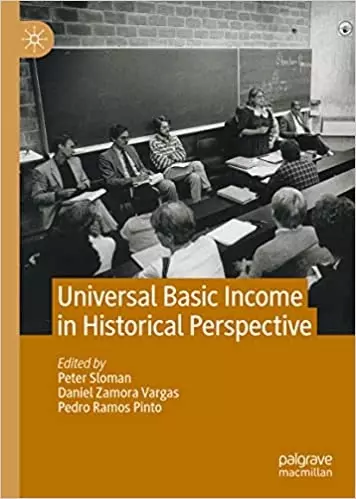Universal Basic Income in Historical Perspective
"Universal Basic Income in Historical Perspective",
This is a very interesting and useful collection of papers, not just on a narrative history of UBI, but on historical perspectives, thereby including important interpretations of the UBI debate, useful in UBI advocacy.
Particularly significant papers from the US experience are
- Daniel Zamora Vargas on the 1960s US history of UBI on guaranteed income and negative income tax, which highlights the distinction between Keynesian government expenditure and consumer cash income as primers of economic growth and poverty alleviation
- Andrew Sanchez on the raging US argument for UBI from technology, or ‘cybernation’ reducing labour income
- Alyssa Battistoni on the feminist argument for basic income as remuneration for unpaid care work, and defence against domestic repression, tracing its history in the 1960s US National Welfare Rights Organization. Battistoni also presents the ecological UBI argument for separating income from work and production.
Turning to European theory, Anton Jäger shows how Marx’s ‘Grundrisse’ shifted to regard work as burdensome rather than dignifying, a shift picked up by Herbert Marcuse and later by André Gorz, whose change of mind to favour unconditionality is described by Walter Van Trier. This is then set in the French UBI debate by Marc-Antoine Sabaté. Human ontology and dignity was no longer work dependent. The call was now for the de-coupling of income and work, for income rather than employment. This is core to the case for UBI.
Samuel Moyn contrasts meeting basic needs with the wider concern for distributive justice in the face of inequality. Liz Fouksman shows that concerns of affordability and the ethic of universality led to UBI being rejected in both South Africa and Namibia in favour of employment as the means to an income. She argues for reparative justice as a foundation for UBI. Even recipients of UBI in a pilot scheme voiced their preference for job creation over cash transfers in her interviews with them, although they were more willing to accept UBI generated from a shared right to mineral resources. Louise Haagh offers an obscure theoretical contribution, and the volume concludes with a delightful interview with philosopher of UBI, Philippe Van Parijs.
Peter Sloman’s more narrative history of UBI in the UK, traces the work of Juliet Rhys-Williams, Hermione Parker, and Malcolm Torry, culminating in revenue-neutral UBI proposals funded by tax increases and benefit withdrawals, leading to Luke Martinelli’s oft-quoted but unfounded claim that UBI is either too small to be meaningful or too large to be affordable. This leads on to the missing element in the volume, that of the definition of affordability in the macroeconomic context. Keynes famously said that ‘anything we can actually do, we can afford’. Affordability is not defined by the intermediate variable of the government financial balance, but by the productive potential of the real supply side of the economy.
As in his 2019 ‘Transfer State’, Sloman makes no mention of macroeconomic proposals for UBI funded by sovereign money. This is an important omission since it addresses a main objection to UBI. In the recent UK Covid furlough scheme, £24,000 was paid to 3m people, costing £69bn which was entirely funded within the £875bn purchase of government debt by the central bank, without causing inflation or devaluation. Since the central bank is owned by the government, the argument is that this is not debt at all. There are now growing arguments, including by central bank economists, that money creation by governments’ central banks is not quintessentially debt, and does not need to be accounted as debt. Funding UBI by debt-free sovereign money addresses the current twin urgent needs to get income to people as labour income declines due to automation, whilst also getting debt out of the economy. This is a convergence UBI advocates should explore and present, as well as incorporate the other useful perspectives on UBI set out in this welcome book.
The book is available here.
Geoff Crocker
Editor ‘The Case for Universal Basic Income'
www.ubi.org

